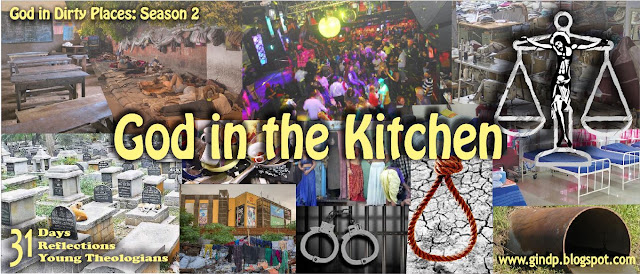A place where no one wants to go, but finally end up. The carcasses with the stories of deaths, vampires, ghosts or devils. One may not have a “noble” birth, but surely wanted a decent end. A place where life ends, that no one builds for themselves, but resides forever. A husband built for his wife, a 42 acre “crown of the palace,” an ivory-cladded white marble mausoleum on banks of Yamuna listed in the seven wonders of the world. For some, a place for pride and remembrance - raising memorials, encroaching the shores of Marina - and at the same, a place for social ostracisation and maintenance of caste system. But as a Christian believer this is a place of peaceful rest, hope and promise for eternal living. The Cemetery or the graveyard.
The Old Testament starts and talks about the first death a brother slayed by his own brother, his blood crying out to God from the ground, an ever-continuous slaying of humanity against humanity by bloody wars, innocents (Sri Lankan Tamils) crying out from the mass graves a never-ending story of agony and pathos. Certainly, humanity has fashioned more graves for murders, than the graves of natural deaths.
The first patriarch bought a piece of land with a cave at Hebron to bury his wife, never thought his descendants would drive away the real owners and claim the land as God given land flowing with milk and honey, symbolising the encroaching attitudes by avaricious industrialised nations turning once cradles of civilization into mass graves.
Whereas in the vision of prophet Ezekiel (Chapter 37) a chunk of dry bones, when prophesied, came together with a rattling noise, sinews on them, flesh coming, skin covering and with a breath turned into a living vast multitude standing on their feet. Thus, a cemetery turned into scene of hope and promise to the whole house of Israel. Yes, cemeteries can be a place for hope and a place where God’s presence acts upon.
In the New Testament, the protagonist of the book raises his friend four days after he was buried and raises himself from the dead after three days, teaching a new thought on empty tombs and empty graves. Thus, cemeteries take pivotal role in the teaching of resurrection and in the promise for eternal life.
In our social context, cemeteries are places of segregation. Even now, separate cemeteries for Dalits and “upper-caste” people legitimately exist in the villages. But the Vettiyans (care takers) come only from the Dalit community. Recently, when a Dalit man’s body was lowered from a bridge in Vellore district the “upper-caste” people barred access to the cremation ground, a judge noted, “We wish the dead ‘Rests in Peace,’ but on the facts and circumstances of this case, we could see that there is no peace for the living nor the dead.”
But the question is does God live in Cemeteries? Certainly yes, only when it takes the role of hope, promise and resurrection. A billionaire or a beggar, a queen or a maid, a politician or a popper, a dictator or a democrat, a white or a black, an upper caste or a Dalit, all descend to a pit with nothing to hold in their hands, its cemetery, with unquenchable thirst craving to hold many more.
Prayer
Loving Parent God, we thank you for the life you have given to us. We thank you for those who have departed before us and for their fruitful life. We pray for the innocents killed and inflicted by wars and other unnatural deaths. Make us a channel of peace and help us to live a meaningful life and make even our end a meaningful one. We pray through Christ who died and rose to life from the cemetery. Amen.
**********
Author: Rev. Philip Richard
About the Author: Philip is an ordained minister of CSI Diocese of Madras. He earned his Bachelor of Divinity from Tamil Nadu Theological Seminary, Madurai and Master of Theology in the Department of Christian Theology from Gurukul Lutheran Theological College and Research Institute, Chennai. He has a rich experience of serving rural congregations of Madras Diocese and presently serves the congregation of Cuddalore Port Pastorate.
















